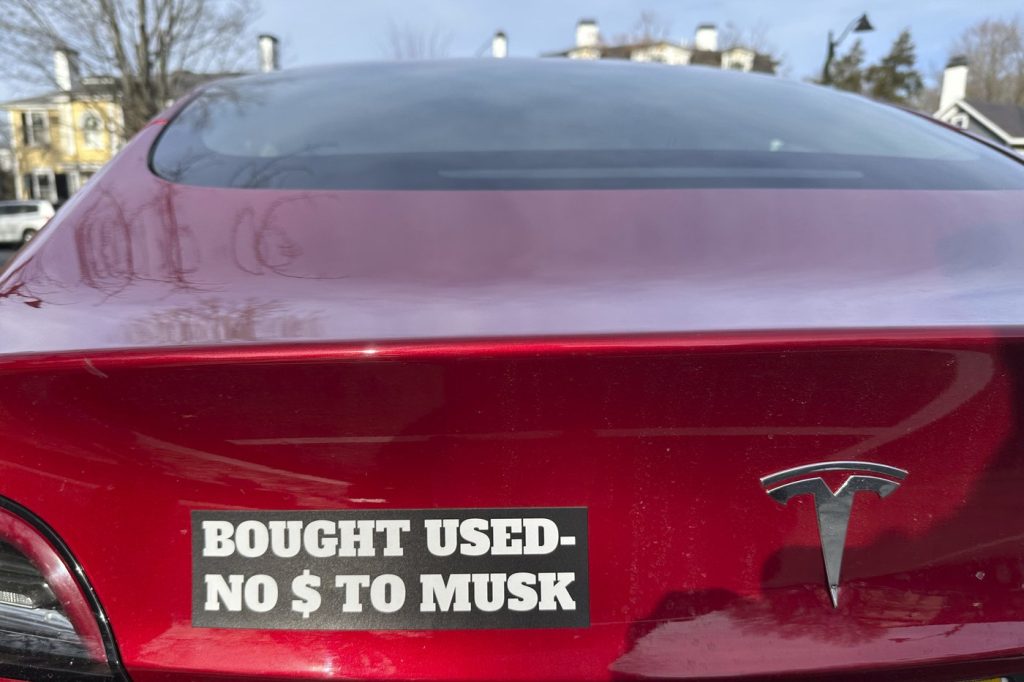MONTREAL - Stéphane Pascalon's Tesla fan club, known as Club Tesla Quebec, has taken a stand to address the growing discontent among its members regarding CEO Elon Musk. The club has decided to distribute hundreds of bumper stickers to help Tesla owners differentiate themselves from Musk, whose controversial actions have led to a decline in pride among Tesla vehicle owners.
A recent survey conducted by the club revealed that approximately 80 percent of its members wished to dissociate from Musk, who has stirred division with his public statements and actions. Around 50 percent of respondents expressed reluctance to participate in public Tesla events, highlighting a significant shift in sentiment. Pascalon remarked that while members were once proud of their vehicles, the divisive actions of Musk have made it challenging to maintain that pride.
The bumper stickers that the club plans to distribute feature a Tesla logo inside a green heart, accompanied by the name "Elon" displayed on a stop sign. As one of the wealthiest individuals globally, Musk has faced a plethora of controversies, including allegations of making a Nazi salute at a presidential inauguration and showing support for far-right political movements. His actions have not only resonated in the United States but have also reverberated through Canada.
Pascalon shared anecdotes from some of the club's 1,700 members who reported aggressive behavior from other drivers on the road, such as receiving the middle finger in reaction to Musk's controversial actions. Moreover, about four percent of those surveyed indicated they would not be purchasing a Tesla for their next electric vehicle, with a small number considering selling their current Teslas.
Recent incidents indicate the mounting anti-Musk sentiment as well. Vancouver police are currently investigating a vandalism case at a Tesla dealership where derogatory graffiti about Musk was discovered. A Reddit post showcasing the graffiti garnered thousands of supportive votes, reflecting a growing public backlash against the CEO.
Additionally, protests against Musk's actions have extended beyond Canada. Reports have surfaced of vandalism targeting Tesla locations in other countries, including graffiti with swastikas at a showroom in the Netherlands, as well as anti-fascist slogans at a factory in Germany earlier this year.
Tim Burrows, a board member of the Electric Vehicle Society, predicts that anti-Musk sentiment will negatively affect Tesla sales in Canada. He noted that he is aware of individuals reconsidering their decision to purchase a Tesla due to the controversies surrounding Musk. There is growing concern that the political climate, marked by comments from Canadian politicians regarding potential tariffs on Tesla vehicles, could further impact the brand's performance.
Federal NDP Leader Jagmeet Singh has suggested that Canada should impose a 100 percent tariff on Tesla vehicles in response to tariff threats from U.S. President Donald Trump. Additionally, Liberal Party leadership candidate Chrystia Freeland has echoed similar sentiments, emphasizing the political ramifications of Musk's actions.
Although Tesla does not publicly disclose sales figures in Canada, rebate data from Transport Canada indicates that approximately 33,000 Teslas received purchase rebates in the first nine months of the fiscal year ending December 31, showing a 15 percent reduction compared to 50,000 rebates issued in the previous fiscal year.
Despite the prevailing negativity, Pascalon believes it is still advantageous to own a Tesla or any electric vehicle, as it contributes to reducing greenhouse gas emissions. Conversely, Burrows expressed concern that Musk's ongoing presence could hinder the broader transition to electric vehicles, citing the potential for slowed electric vehicle adoption and fewer purchase incentives as considerable obstacles in the industry.










